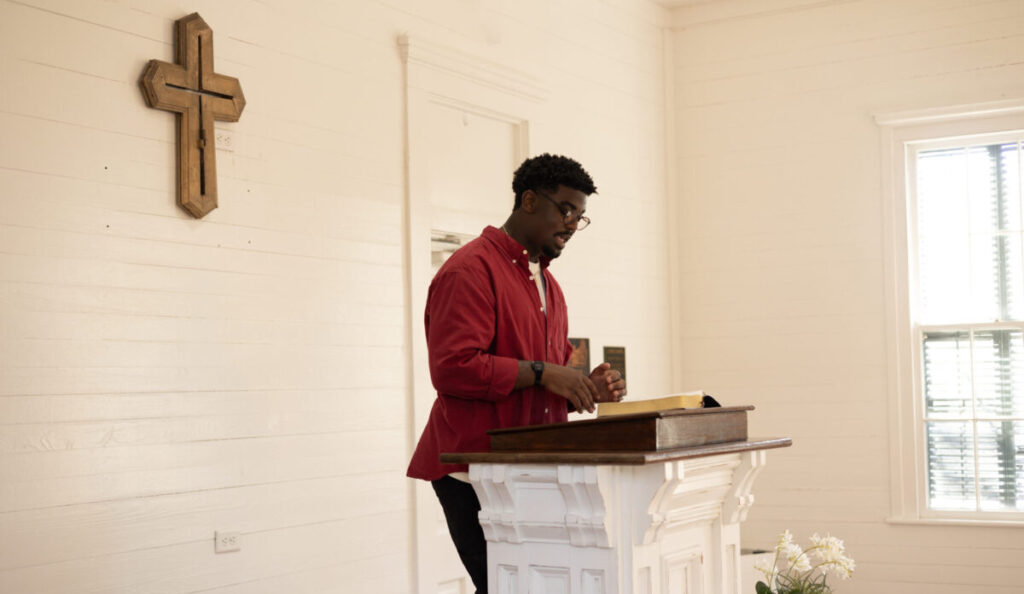University of Mobile (UM) trustees continue to see a bright future, said UM President Mark Foley.
During its semi-annual spring meeting April 25, the UM board of trustees approved the establishment of the school of leadership development, elected a new chairman of the board and added a course to the core curriculum.
Foley said the school of leadership development will provide both college students and members of the Gulf Coast community with access to practical leadership training. The program will include an undergraduate minor in leadership, adult studies in organizational management, professional development seminars and continuing education courses in value-centered leadership.
Karen Delzell, dean of the school of leadership development, said, “The school of leadership development will provide our students and members of the community in the Gulf Coast region with courses designed to challenge them and prepare them for leadership roles in their professions.”
“In today’s society, it’s not enough to be academically prepared — our graduates must develop leadership skills with a strong moral and ethical base,” Foley said. “The new school of leadership development will provide our students — and members of our community — with the academic and practical background that will enable them to be the true leaders of tomorrow.”
Noting it is the responsibility of higher education to lead the change toward a more moral and ethical society, Foley said the establishment of the new school puts UM at the forefront in meeting that need.
“At the University of Mobile, we say that we are changing lives to change the world,” Foley said. “I believe we can put competent, clear-eyed men and women who hold to certain values in their lives in the work force and over time that will create change in those areas,” he said. “It is a way of working out the Great Commission. I want to put science majors, business majors and physicians in the work force with the nature and ethics of Christ. I want to give them better tooling to make more of a difference.”
Related to Foley’s vision of developing leaders, UM trustees also approved the insertion of a biblical ethics course as part of the core curriculum. “We not only want them to know what the Bible says, but how to make decisions based on it,” Foley said.
Leading the board of directors for the next two years will be Robert McGinley, a member of First Baptist Church, North Mobile. McGinley, an orthopedic surgeon with The Orthopedic Group, P.C. in Mobile, succeeds Gary Enfinger, pastor of Thomasville Baptist Church.
A graduate of Princeton University in Princeton, N.J., and Emory Medical School in Atlanta, McGinley served in the U.S. Navy from 1971-73 and is a member of various medical organizations and societies. He is also a member of the board of directors of UMS-Wright Preparatory School and Commonwealth National Bank.
McGinley has participated in medical missions trips to Nigeria through the International Mission Board and has served as a UM trustee for 10 years.
Foley described the meeting as “one of the most positive and encouraging meetings I recall.
“This board understands they are getting accurate information, and they don’t question that,” Foley said. “There is a plan.
“The future is not going to be easy. There will be some challenges, but we are fully confident and excited about the future,” he noted.
Foley, who came to UM in February 1998 following former president Michael Magnoli’s resignation, pointed out that more students are responding to the opportunities at UM.
“The university never faltered in the academic area,” he said of the financial and public relations troubles the university suffered in the ’90s. “The students and the product delivered to the students was never compromised.”
With a little more than 2,000 students enrolled during the fall of 1999, Foley expects the same level or a slight increase in the fall of 2000.
The university’s Latin America Branch Campus (LABC) in Nicaragua, which was the source of UM’s troubles, will soon be handed over to Ava Maria Institute in Ann Arbor, Mich.
“We are on the right track … to conclude the end of June,” Foley said. “We are grateful that … the campus can continue offering Christian higher education in Nicaragua. It will be under a Catholic administration,” he noted.
“This will allow us to put our focus on Mobile, Alabama and the southeast,” he said. “This whole experience in concluding that work is nothing short of the work of God. It could not happen in human efforts.”
UM was placed on probation in 1997 by the Southern Association of Colleges and Schools, a regional accrediting agency, because of financial difficulties brought on by the LABC and ventures by Magnoli. The university was removed from probation Dec. 7, 1998, a few months shy of Foley’s one year anniversary as president.
“I am in awe of the dedication of the faculty, staff and trustees of this university,” Foley said. “They weathered through an incredibly awful experience and stayed by the stuff. They have allowed me to bring my thoughts to bare and followed my lead as one who is trying to earn the right to be called one of them.”
Two years into its five-year recovery plan, UM is headed toward solid financial health, Foley noted. “My overall strategic approach is right on target,” he said. “The process, though it must go through some painful times, will result in a solid, efficiently operating organization when we are through. It is already achieving those goals.”
In other business, trustees authorized UM administration to move forward with plans to build a 4,400-square-foot sports medicine facility to house the sports medicine program.





Share with others: